- Israel is a country in the Middle East, on the southeastern shore of the Mediterranean Sea and the northern shore of the Red Sea. It has land borders with Lebanon to the north, Syria to the northeast, Jordan on the east, the Palestinian territories of the West Bank and Gaza Strip to the east and west, respectively, and Egypt to the southwest.
- Israel’s economy and technology center is Tel Aviv, while its seat of government and proclaimed capital is Jerusalem, although the state’s sovereignty over East Jerusalem is not recognized internationally.
- As coterminous democracies, India & Israel that gained independence in 1947 and 1948 respectively, the trajectory of their bilateral ties has not been smooth till cold war era (it being in USA block), but post cold war they have set to become ‘natural allies’.
- The very distinct history of Israel and its settlement in the Muslim world created a different sort of geopolitical realities after the Second World War. The entwined Palestine in this circumstance has been one of the prominent determiner of Israel relation with any country.
- India’s policy towards Israel has been intimately linked to India’s support for the Palestinian cause and the impact India- Israel relations have on India-Arab Relations. India was the first non-Arab country to recognize the Palestine Liberation Organization (PLO) as the ‘sole legitimate representative of the Palestinian people’, and later gave the PLO office in New Delhi full diplomatic recognition. In keeping with this approach, India joined the Arab countries in opposing the partition of Palestine, and it was only in 1950, two years after Israel came into existence, that India granted de jure recognition to the State of Israel. Soon after, Israel established an immigration office in Bombay which was later converted into a Trade Office and subsequently a Consulate. However full diplomatic relations were established only in 1992 (after cold war) and Embassies were opened.
- It was not till 1992, after the Middle East Peace Process at Madrid in 1991 between Israel and the Arab States had begun, and the break-up of the Soviet Union had changed the geopolitical balance decisively in favour of the US, that India felt emboldened to exchange diplomatic Missions with Israel. Since then, however, relations have rapidly grown in all fields, especially in the military field. Israel has emerged as a significant and reliable source of defence supplies and advanced sensitive defence technologies, second only to Russia.
- India particularly appreciated Israel’s willingness to supply military equipment and ammunition during the Kargil operations in 1999 and Operation Parakram (launched in the wake of the December 13, 2001 terrorist attack on Parliament, it was the first full-scale mobilization since the 1971 Indo-Pak war) in 2002.
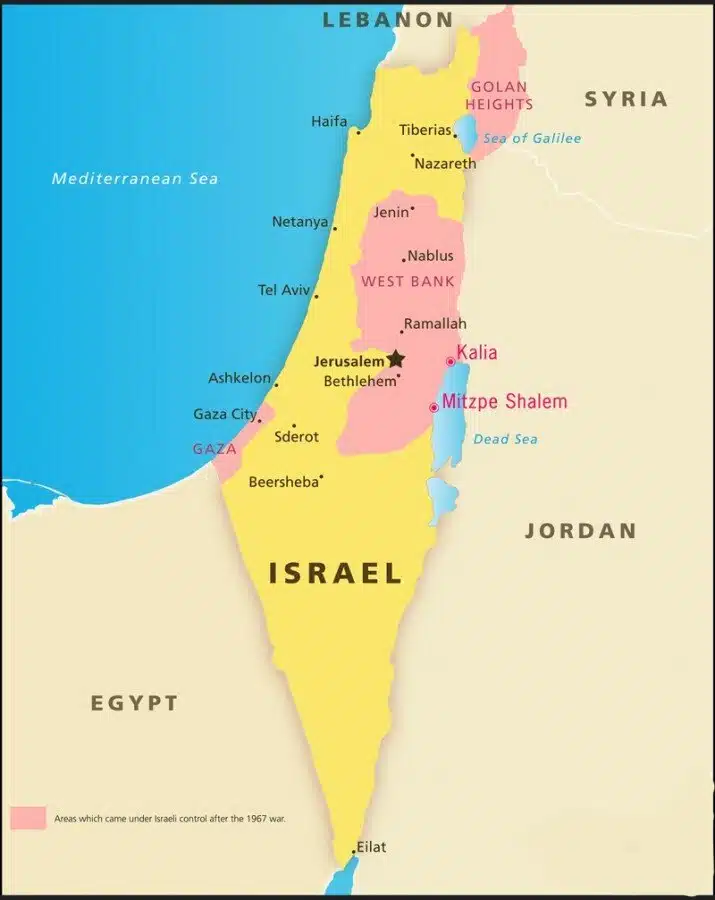
Areas of Cooperation
Political
- There have been frequent Ministerial level exchanges in the recent past. The Prime Minister and the President of Israel visited India in 2003 and 1997 respectively.
- President of India visited Israel in October, 2015 and Prime Minister of India visited Israel in July, 2017.
- Prime Minister of Israel visited India in January 2018 marking twenty fifth anniversary year of India-lsrael relationship and its growing partnership. A number of MoUs/Agreements were signed on areas such as cyber security, energy cooperation, Air Transport Agreement film co-production, Homeopathic medicine, Space investment opportunities and solar technology.
- As of December 2020, India was among 164 United Nations (UN) member states to have diplomatic ties with Israel.
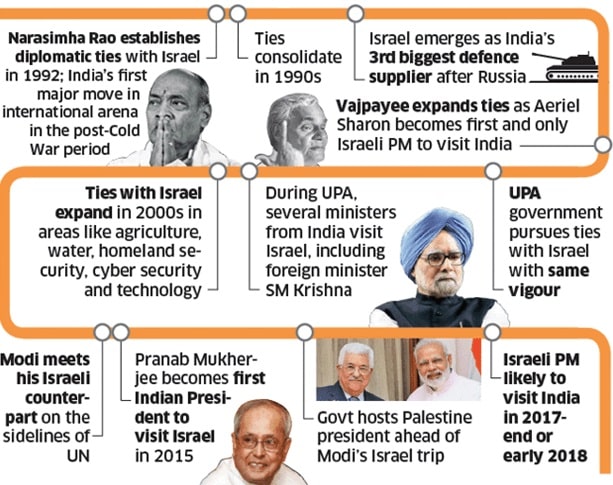
Economic and Commercial
- From US$ 200 million in 1992 (comprising primarily trade in diamonds), bilateral merchandise reached US$ 5.19 billion in 2011. The trade balance stood in India’s favour at $1.1 billion in 2016-17. Though trade in diamonds constitutes close to 50% of bilateral trade, trade has diversified into several sectors such as pharmaceuticals, agriculture, IT and telecom, and homeland security in recent years. The total bilateral trade in services was about US $ 407 million in 2012.
- India is Israel’s third-largest trade partner in Asia and seventh largest globally.
- Israeli companies have invested in India in energy, renewable energy, telecom, real estate, water technologies, and are focusing on setting up R&D centers or production units in India.
- India is also in dialogue with Israel for concluding a Free Trade Agreement (FTA).
- In recent years, Israel has taken a strategic decision to strengthen economic relations with China, Japan and India.
Investment
- Despite recent enthusiasm about the growing trade and investment between Israel and India, any real market potential is yet to be achieved. Between April 2000 and March 2017, cumulative FDI from Israel to India reached US$ 122 million.
- Israeli companies have invested in India in energy, renewable energy, telecom, real estate, water technologies, and are also setting up R&D centres or production units in India.
Agriculture
- Bilateral action plan for 2015-18 is currently operational.
- It aims to expand cooperation into new sectors such as dairy and water. The previous plan for 2012-2015 expanded agricultural cooperation into different states such as Haryana, Maharashtra, Rajasthan, Gujarat, etc.
- India has benefited from Israeli expertise and technologies in horticulture mechanization, protected cultivation, orchard and canopy management, nursery management, micro-irrigation and post-harvest management. Israeli drip irrigation technologies and products are now widely used in India.
- India-lsrael development cooperation – three-year work programme in Agriculture (2021-2023), aimed at establishing Centers of Excellence, intensifying value chains and encouraging private investment.
Defence and Security
- One of the strongest pillars of the bilateral relationship. Nearly 41 % of Israel defence exports are to India, Israel has been a source of advanced military technology to India. India buys more than a $1 billion of equipment every year and that over 40% of Israel’s arms exports in 2012-16 were to India.
- Israel is apparently willing to offer India critical defence technologies unavailable from any other country, making India’s defence capacity less vulnerable to third-party pressures. Israel is also helping modernize India’s ageing Russia-made weapon systems. There are regular exchanges between the armed forces and defence personnel.
- There is ongoing cooperation on counter-terrorism issues, including through a Joint Working Group on Counter-Terrorism.
- In February 2014, India and Israel signed three important agreements on Mutual Legal Assistance in Criminal Matters, Cooperation in Homeland and Public Security, and Protection of Classified Material.
- Indian Air Force (IAF) contingent took part in the multilateral air exercise ‘Blue Flag 2017’ held in southern Israel from November 2-16, 2017. This was the first time that an IAF contingent has participated in air exercises with the Israeli Air Force (IsAF).
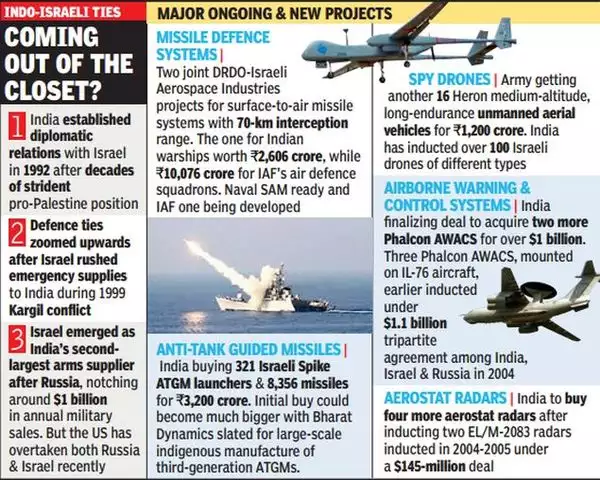
Defence Equipment
- India has purchased Barak I missiles, 3 phalcon AWACS, and Israeli Spike anti-tank missiles from Israel. Medium-range surface-to-air missile (MR-SAM) systems called Barak-8 missile is also being developed for Indian Navy and IAF.
- There are several big-ticket deals in the pipeline including two more Israeli Phalcon AWACS (airborne warning and control systems), which are to be mounted on Russian IL-76 military aircraft, and Heron, Searcher-II and Harop drones to Barak anti-missile defence systems and Spyder quick-reaction anti-aircraft missile systems.
- In October 2018, Israel Aerospace Industries (IAI) signed a US$ 777 million contract with India for the supply of Barak 8 long-range surface-to-air defence missiles and missile defence systems for the Indian Navy.
- At the 15th Joint Working Group (JWG 2021) meeting on Bilateral Defence Cooperation, countries agreed to form a Task Force to formulate a comprehensive Ten-Year Roadmap to identify new areas of cooperation.
Cyber Security
- India and Israel are committed to promote security and stability in cyberspace, on both the governmental and private levels. Both sides also recognise the value of enhancing and further institutionalizing their broad-based cooperation on cyber issues through a Framework for cooperation in the area of cyber security.
Terrorism
- Recognizing that terrorism poses a grave threat to global peace and stability, India and Israel share their strong commitment to combat it in all its forms and manifestations. India and Israel assert that strong measures should be taken against terrorists, terror organizations, their networks and all those who provide sanctuary to terrorists and terror groups.
- India-lsrael statements underscore the need to ensure that terrorist organizations do not get access to any WMD or technologies. Israel supports for the early adoption of the Comprehensive Convention on International Terrorism (CCIT).
Science and Technology
- India-lsrael cooperation in S&T has evolved on two tracks. There is joint research by S&T institutions under the S&T Cooperation Agreement signed in 1993.
- Secondly, under an MOU on Industrial Research and Development Initiative signed in 2005, a joint industrial R&D fund i4RD (India-lsrael Initiative for Industrial R&D) was set up to promote bilateral industrial R&D and specific projects. Under i4RD, joint industrial projects are funded.
- In January 2014, India and Israel held extensive discussions to establish an India-lsrael Cooperation
Fund aimed at promoting innovations through joint scientific and technological collaborations.
Space Cooperation
- In 2002, India and Israel signed a cooperative agreement promoting space collaboration. India has successfully launched TecSAR and RISAT-2 radar imaging satellites of Israel from PSLV of ISRO.
- Space has emerged as one of the areas in which both countries have begun to collaborate. During Prime Minister of India’s visit to Israel in July 2017, MoUs on Plan of Cooperation between the Indian Space Research Organisation (ISRO) and the Israel Space Agency (ISA) regarding cooperation in Atomic Clocks, GEO-LEO Optical Link and in Electric Propulsion for Small Satellites were signed.
Culture and Diaspora
- India is known in Israel as an ancient nation with strong cultural traditions. Every year, 30-35 thousand Israelis visit India for tourism business and other purposes.
- Over 40,000 Indians visit Israel every year. They are mostly pilgrims who visit holy sites. In 2017, a record 70,000 tourists from India visited Israel. This trend continued into 2018, with 40,000 Indian tourists visiting Israel during just the first six months of the year. Air India began running faster (approximately 7 hours) direct flights between New Delhi and Tel Aviv four times per week in March 2018, so tourism numbers are expected to continue to climb.
- There are approximately 85,000 Jews of Indian-origin in Israel (with at least one Indian parent), who are all Israeli passport holders. The main waves of immigration into Israel from India took place in the fifties and sixties. The majority is from Maharashtra (Bene Israelis) and relatively smaller numbers from Kerala (Cochini Jews) and Kolkata (Baghdadi Jews). In recent years some Indian Jews from North Eastern states of India (Bnei Menashe) have been immigrating to Israel. While the older generation still maintains an Indian lifestyle and their cultural links with India, the younger generation is increasingly assimilated into Israeli society.
- The 2nd International Yoga Day in Israel was attended by more than 2,000 people. During Prime Minister of India’s visit to Israel in 2017 it was agreed to establish an Indian Cultural Centre in Israel.
- India has emerged as the preferred destination for young Israelis wanting to unwind after their compulsory military service and Hebrew signage in Varanasi, Manali, Kasauli and Goa is evidence of increasing people to people contact.
- Know India Programme and Study India Programmes have strengthened the cultural interaction between the two nations. An Indian Cultural Centre will be opened in Israel in pursuance of the desire to promote greater cultural understanding.
Others:
- Israel is also joining the India-led International Solar Alliance (ISA), which aligns very well with the objectives of both countries to scale up their cooperation in renewable energy and partner in clean energy.
Significance of Israel to India
India and Israel live in complex geographies and are aware of strategic threats to regional peace and stability.
Defence:
- India is Israel’s biggest arms market, with an average of $1 billion of Defence sales per year. Israel has become one of India’s most important weapons suppliers, after Russia and the US. Israel cooperation is vital to achieve strategically critical self-reliance in defence production.
- Israel has supported India in two wars with Pakistan and supply of artillery shells during the Kargil war, when India faced a shortage underscores the importance of Israel.
Kashmir:
- Israel supports India’s stand on Kashmir and efforts to address cross border terrorism.
Agriculture and Water Management:
- Israel, a global leader in drip irrigation, has pioneered desert agriculture with sparse supplies of water. India has benefited from Israeli technologies in agriculture and water management. IDE, an Israeli company, has built several desalination plants in India, including a 100-million-litre per day desalination plant at Nemmelli in Tamil Nadu.
Terrorism:
- Israel supports CCIT (Comprehensive Convention on International Terrorism) proposed by India to combat terrorism in all of its manifestations.
- Counter terrorism and military cooperation have been centrepiece of bilateral relation.
- Flagship initiatives like ‘Startup India’ and ‘Smart Cities’ are also poised to gain inspiration and traction from joint ventures with Israeli corporate and public policy successes.
Regional Security:
- The peace and stability of West Asia is of strategic interest to India. The tension and rivalry between Saudi Arabia and Iran has become the defining geo-political issue, creating space for India to energize ties between Israel and other countries in the region.
India-lsrael-USA:
- The valuable political support that the Jewish lobby provides in the US makes Israel a desirable partner for India. As India and the US have come closer over the last few years, there have been some tentative moves to forge a trilateral strategic relationship between the three countries.
Significance of India to Israel
Israel is determined to take the bilateral engagement to a different level that goes beyond defence hardware and intelligence software.
Defence Market:
- India is Israel’s top destination for arms exports, buying 41 per cent of Israel’s arms export between 2012 and 2016, according to the Stockholm International Peace Research Institute (SIPRI), an independent global conflict and arms-research institute.
- Therefore, Israel has good economic prospects in strengthening ties with India in view of the fact that India is in direction to modernise its military.
Palestine:
- India has always tried to maintain the balance between Israel-Palestine issue and has supported two state solution. However, in 2015, India abstained from voting against Israel on U.N. Human Rights Council report, which found evidence of “alleged war crimes” committed by both Israel and Hamas during the Gaza conflict in 2014, particularly calling for accountability of Israeli officials. The reason was UNHRC resolution had included a reference to taking Israel to the International Criminal Court, which India considers ‘intrusive’.
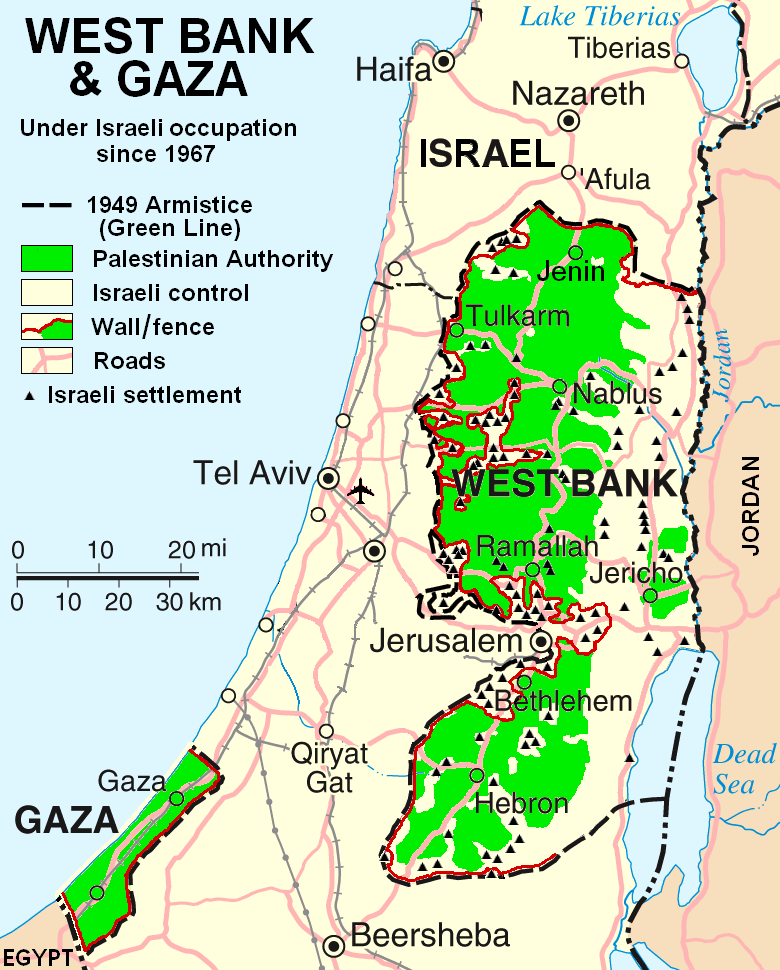
Middle East Problem:
- The nuclear deal between the US and Iran, along with Russia’s support to Hezbollah (a Shia militia group) and the ‘Assad’ (Syria) regime has further required Israel to forge close ties with India.
Tourism:
- India has emerged as the preferred destination for young Israelis wanting to unwind after their compulsory military service.
Challenges in Relations
Palestine Issue:
- India supports the “two-state” solution between Israel and Palestine and will support all efforts for a resolution, including on the contentious issue of Jerusalem, which Israel has claimed in its entirety since 1967. On India’s abstention from UNHRC voting in 2015 on Gaza Strip issue, Palestine expressed ‘shock’ and criticized the vote as a ‘departure’.
- Recently, US President announced that the US will recognise Jerusalem as the capital of Israel. Reiterating its traditional policy on Israel-Palestine issue, on 21st of December 2017, India voted for a negotiated settlement of the Jerusalem issue at the UNGA (UN General Assembly).
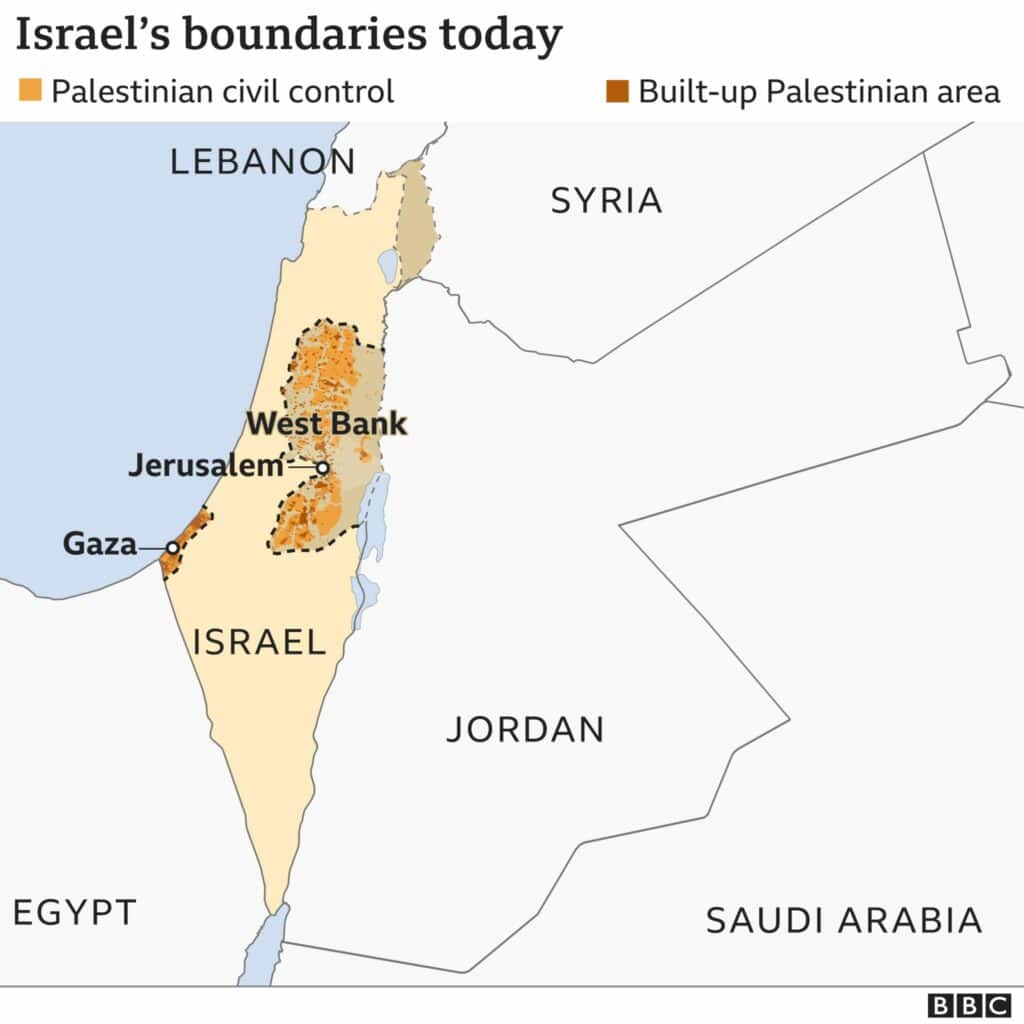
Israel Palestine conflict
- It is a decades long dispute between Israel and Palestine which began in the middle of the twentieth century when the Jews from various parts of the world were granted the homeland in present day Israel by Britain.
- It is one of the world’s longest conflicts where Israel has occupied the West bank and the Gaza Strip which the Palestine state claims.
- Numerous attempts have been made to resolve the conflict as part of the peace process by various groups of countries and the United Nation.
- With time, the countries around have normalise the ties with Israel through the Abraham Accord, Oslo Accord (PLO itself).
- But the deadlock still persists but the world community is persistent in its effort to attain the 2 state solution.
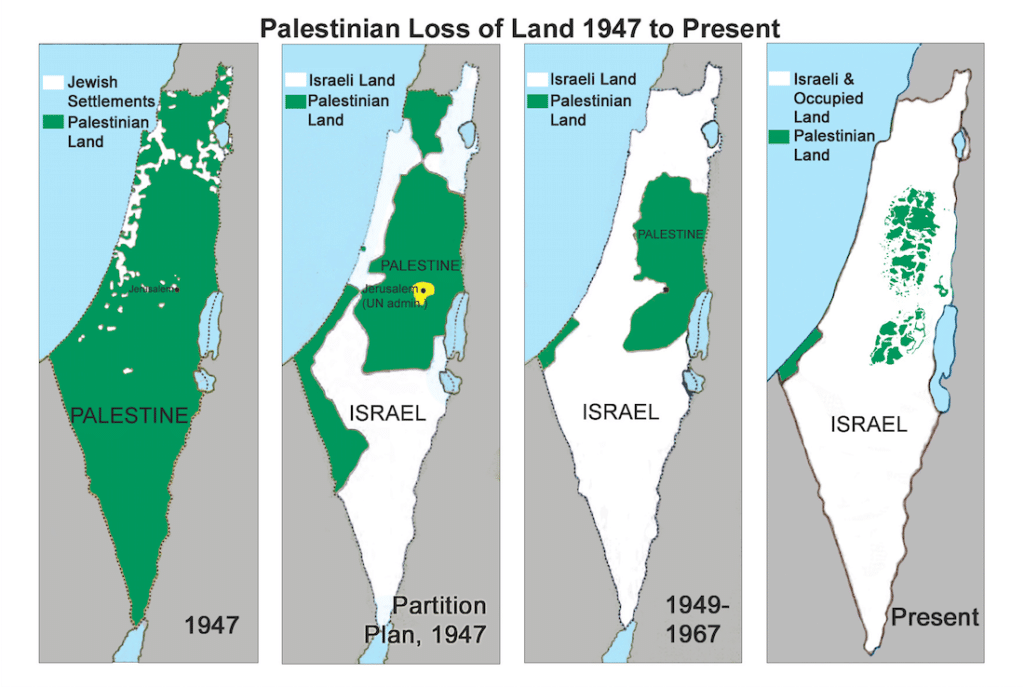
Bilateral Investment Treaty (BIT):
- In 1996, India and Israel signed a BIT. However, this was reportedly terminated by India when it unilaterally discontinued 58 BITs recently. For a new BIT to be negotiated, both sides will have to start afresh. However, there are challenges given the many fundamental differences Israel and India have on BITs, as outlined in their Model BITs of 2003 and 2016, respectively.
- The First difference is on the Investor-State Dispute Settlement (ISDS): The Israeli model gives an investor the choice to submit any investment dispute with a state to international arbitration if not resolved within six months through negotiations. The Indian model imposes many procedural and jurisdictional restrictions on an investor’s right to bring an ISDS claim.
- Second, Israel’s model provides a broad assetbased definition of foreign investment that covers both FDI and portfolio investment. The Indian model of 2016 defines investment narrowly as an enterprise (with its assets) that has to possess certain characteristics of investment including the investment having ‘significance for the development’ words not defined in the BIT-of the host country.
- Third, the Israeli model contains a broad Most Favoured Nation (MFN) provision – a cornerstone of non-discrimination in international economic relations – which is missing in the Indian model.
The absence of MFN, from Israel’s perspective, would mean that its businesses would have no remedy under international law if India were to discriminate against it, say, by offering greater incentives to another defence manufacturer over an Israeli one. - Fourth, the Indian model excludes taxation altogether from the purview of the BIT. Thus, the foreign investor cannot bring an ISDS claim even if taxes imposed are confiscatory, discriminatory or unfair.
Trade:
- Since 2010, the two countries have been negotiating a free-trade agreement for goods and services, which should boost investments and trade ties. There exists a need to boost bilateral trade and diversity in economic cooperation areas to realize the untapped potential.
Arab World and Israel:
- India’s traditionally close ties with the Arab world have always been a factor of hesitation in openly engaging with Israel.
Approach towards China:
- India and Israel differ in the approach towards China. While India is cautious towards China’s rise, China is Israel’s largest trading partner in Asia and has strong technology and investment linkages.
De-Hyphenating Israel-Palestine:
- Two State solution and India voting in favor of the resolution on raising the Palestinian flag at the United Nations, and to sign on to BRICS declarations of “opposing the continuous Israeli settlement activities in the Occupied Territories” emphasizes that India’s support for Palestinians remained “undiluted.” However, India de-hyphenating Israel-Palestine relation has been widely reported by media during Indian PM Visit to Israel in July, 2017.
De-hyphenation
- All Indian dignitaries including President of India have always visited both Palestine and Israel together, never stand-alone. But Prime Minister ‘s recent visit to Israel alone, without it being clubbed with an engagement with Palestinian leaders in Ramallah, gave an indication of India’s attempt at de-hyphenating Israel and Palestine.
- De-hyphenating means dealing the issues independently rather taking two issues always together. Hyphenation limits one’s strategic space.
- Benefits of De-hyphenation The de-hyphenated approach, in turn, potentially gives Indian policy makers more space to take India’s relationship with Israel further. A hyphenated foreign policy even in regions other than West Asia had handicapped India’s ability to forge pragmatic ties that help India’s national interests.
- India’s Present Position India has emphasized its “strategic intent and commitment to simultaneously enhance relations with the Arab world as well as Israel, without allowing it to become a “zero sum game”. India’s policy is that of extending strong support to Palestine cause while maintaining good relations with Israel.
Recent Developments
- UNGA Resolution, 2017: India voted against the recognition of Jerusalem as capital of Israel.
- UNHRC Resolution, 2018: India voted in favour of a resolution condemning use of israeli forces against the Palestinians.
- UNHRC Resolution, 2021: India abstained from voting in a resolution intended to set up a permanent commission to probe human rights violations in Gaza, West Bank and Palestine.
- Despite India voting against Israel in the UN or abstaining from voting in favour of Israel, both countries have leveled up their engagement since 1992.
- Pegasus row: It is spyware software manufactured by a private Israeli company. The news of Pegaus being used in India created a public uproar.
- Geo-strategic experts are of the view that the row won’t affect the India-Israel relationship as it’s the consenting governments who buy the software for their internal and external security.
- Abraham Accord: The accord has normalised the relations between many west Asian countries and Israel.
- It has given India a diplomatic leeway to enhance its engagement with Israel.
Pegasus Row
- Pegasus is a spyware manufactured by NSO Group, a private company based in Israel.
- It is a malicious software which infects the target mobile phone/laptop without any click on the links and monitors the activity of the host.
- The company said in the statement that it sells the product to the governments and with Israel defence exports council approval. It also said that the Pegasus is intended to fight terrorism.
- Human Rights activists have alleged that the states have been using the software to target vocal journalists, human rights watchdogs and the civil society.
India-lsrael Relations: Critical Perspectives
- Modi government has ended Delhi’s obsession of viewing the region solely through the prism of “Arablsraeli conflict”. No nation in the Arab world is making Israel the touchstone of relations with the rest of the world. This change can be seen in terms of confident engagement of Israel in India’s geostrategic calculation.
- Even though India’s defence, security and economic relations with Israel have been on the upswing since the 1990s, Modi government has been credited with elevating the strategic dimension and introducing focus, direction, and substance in India-lsrael partnership by bringing relations “out of the closet.” Under his leadership, New Delhi not only expanded the scope of India-lsrael strategic partnership but also moved towards abandoning the traditional “balancing act” between Israel and the Arab World (Palestine).
- A hallmark of the Modi government’s foreign policy has been a self-confident assertion of Indian interests. This is reflected in government’s moves vis-a-vis Israel, marking a distinct break from the unnecessary and counterproductive diffidence of the past. Despite sharing more than 25 years of diplomatic ties and working closely on defence, counter-terrorism, agriculture and energy related issues, no Indian Prime Minister or President has ever visited Israel.
- The domestic political milieu continues to exert its substantial influence on the trajectory of India-Israel relations. Israel has been a good friend of India but New Delhi continues to be shy of demonstrating its friendship. At crucial times, when India needed Israeli help, it got it unreservedly. Such help must be recognized to come closer.
- The terrorism that both India and Israel face comes not only from disaffected groups within their territories; it is also aided and abetted by neighbouring states, increasingly capable of transferring weapons of mass destruction to terrorist organisations. Such a similar situation creates imperative for both to come together and show exemplar toughness.
- However, the focus of Indian President’s speech in Israel during his visit in 2015 was India’s economic and technological cooperation with Israel, while in Palestine and Jordan, he said New Delhi remained committed to the Palestinian cause, indicating that India does not plan on abandoning its traditional support for Palestinian statehood. This policy is reminiscent of the ideological trappings of India’s West Asia policy. At a time when the strategic partnership between India and Israel has emerged well above the traditional Defence and trade relations, the President’s comments indicate that domestic politics and ideological inhibitions still underscore the Israel policy.
- India’s preoccupation with viewing Arab-lsraeli relations through the prism of the Palestinian issue adds another dimension to New Delhi’s indefinite regional policies. Arab-lsraeli relations have undergone a shift and so, the imperative of ‘balancing’ its West Asia policy need not be cast in the traditional mould. However, there has been some change in India’s policy towards Palestine. While India continues to express its support to the Palestinian cause, it has simultaneously toned down its reactions to Israel’s treatment of Palestinians. It has also begun denouncing Palestinian suicide bombings and other terrorist acts against Israel, something that was seen earlier as justified in light of the Israeli policy against the Palestinians.
- It is increasingly evident that such re-evaluation has been based on a realization that India’s largely pro-Arab stance in the Middle East has not been adequately rewarded by the Arab world. India has received no worthwhile backing from the Arab countries in the resolution of problems it faces in its neighbourhood, especially Kashmir. There have been no serious attempts by the Arab world to put pressure on Pakistan to reign in cross-border insurgency in Kashmir.
- On the contrary, the Arab nations have firmly stood by Pakistan, using the Organization of Islamic Conference (OIC) to build support for Islamabad and the jihadi groups in Kashmir. If Arab nations, such as Jordan, have been able to keep their traditional ties with Palestine intact while building a new relationship with Israel, there is no reason for India not to take a similar route, which might give it more room for diplomatic manoeuvring.
- Nevertheless, according to C. Raja Mohan, a prominent Geopolitical commentator, the NDA government understands the sensitivities involved with Palestine, and is also acutely conscious of India’s expansive stakes in the Arab Gulf- as the principal external source of India’s energy imports, the most important destination for India’s labour expatriate labour and a major market for India’s goods. He is also aware of the significance of the partnership with Iran in securing India’s interests in Central Asia and the stabilization of Afghanistan after the withdrawal of American troops from there.
- In this light, the government has denied assertions of a “fundamental departure” from its support to the Palestinian cause. Moreover, when President Pranab Mukherjee visited Israel, he visited Palestine too. And he did devote considerable energies towards reiterating India’s “unwavering” support to the Palestinian cause and commitment to “work with all like-minded nations for the amicable resolution of this protracted conflict”.
- However, India’s ability to separate the Palestinian issue from Indo-lsraeli relations could be tested in the future. As the security situation in Israel and the Palestinian territories deteriorate and Israel faces greater international pressure to negotiate an end to the conflict, it may not be long before Tel Aviv turns to New Delhi for diplomatic support. India may therefore, be compelled to take a more definitive stance on the conflict which it has, up until now, avoided.
- The ongoing competition and conflicts in West Asia have re-affirmed the need for a new and robust approach to promote regional security. The depth and variety of India’s interests in West Asia do not countenance an either – or approach to the region where we can seek to build ties with one party at the expense of the other. Again, the turmoil in the region, in which most of the givens of the past are being challenged in an environment of sharp competition, makes it urgent that all-round stability be pursued vigorously.
Way Forward
- P2P contact: Despite increasing bonhomie between the two states, the people to people contact still lacks. Increased citizens engagement will give further depth to the relations between the two countries.
- Bigger trade volumes: Though the trade volumes between the two countries have been increasing year on year, still it’s much below its potential level. FTA should be executed soon and the trade basket must expand.
- Striking balance: Though Israel comes across as a natural partner, India should also be concerned about the human rights issues in Palestine. So far, India has been able to balance its geostrategic needs and international morality.
- China and Israel: Of late China’s engagement has been continuously growing with Israel primarily for the latter’s technology. India should be proactive in evolving its partnership with Israel from hereon.
- India and Israel share a special multidimensional, multidisciplinary, and comprehensive relationship, characterized by pragmatic diplomacy and trust. Differences on some issues still exist, but they are not unbridgeable.
- India and Israel have strong joint international cooperation schemes and can explore and undertake joint ventures in different fields in countries like Maldives, Sri Lanka, Myanmar, and Afghanistan, where both the countries have interests.
- There are many more fields in which bilateral cooperation will benefit both countries. A widespread perception exists that Indo-lsrael relations are based on the military and security perspective, but the base is much broader and it will expand into more sectors in the future. The full potential of the India-lsrael relationship is yet to be realized, and there are many more areas in which India and Israel can work together in the coming years.

Sir please update the content wrt ongoing events!